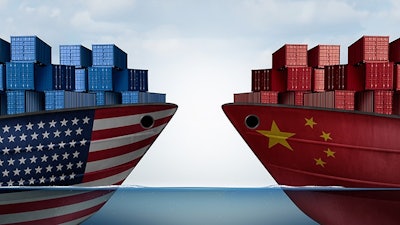
The United States increased tariffs from 10 to 25 percent on Chinese exports May 10 in an escalation of its trade war with China, and Arnaud Dumas de Rauly, co-CEO of The Blinc Group, says the move will increase costs for many businesses across the cannabis supply chain.
“If you look at the entire impact that these tariffs will have on the industry, it’s pretty big,” Dumas de Rauly told Cannabis Business Times. “People tend to think it’s going to be just on the vaping hardware side. Of course, that’s going to be a big part of it, but … every ancillary business, or at least 95 percent of ancillary businesses, rely on products that come from China.” Steel and aluminum get the headlines, but these tariffs will continue to put pressure on prices for products that include vaporization apparatuses, insulated electrical conductors and assorted battery components.
The raised tariffs will likely cause a 20 to 25 percent cost increase for vaping devices, packaging, extraction equipment, dispensaries’ exit bags and other products that are primarily manufactured in China, he said, which will likely increase costs for consumers.
“Some of these costs can be borne by the companies themselves, but once you add all of that up, at some point, it just doesn’t become profitable anymore,” Dumas de Rauly said.
While the trade war has largely been triggered in the White House by the idea that China is siphoning American jobs and know-how, Dumas de Rauly said that the cannabis industry paints a different picture. The manufacturing jobs that produce popular cannabis products and the intellectual property behind the actual manufacturing processes have never been based in the U.S. to begin with. The technology around vaping devices, in particular, is constantly evolving, he said, and thus no one in the U.S. has invested in manufacturing the products—the vape cartridges themselves —due to the tremendous cost and workforce required to produce the quantities needed.
“It has always been in China,” he said. “So, the rationale behind this trade war and these tariffs is completely false and doesn’t stand ground with what’s happening in our industry.”
Companies can apply for exemptions on certain classes of products that are imported from China, and cannabis businesses should consider applying for exemptions for the products they import, Dumas de Rauly said.
“There are a lot of different reasons that you can vote to apply for exemptions,” he said. “To be pragmatic, are these exemptions going to be given? I don’t know. We applied for one a couple of months ago. We still haven’t heard back. But I really think as an industry, we come together and apply for these exemptions, and it’s going to make enough noise for people to understand that it’s not going to be impacting American jobs and it’s not going to be stealing American know-how.”
Lobbying should also be a key component of cannabis businesses in order to help shape these regulations, Dumas de Rauly added.
“I would say roughly 10 percent of the time of any manager in this industry should be [spent] lobbying—talking to local reps, talking to various organizations and getting word out there that these tariffs are going to hurt businesses,” he said. “And in the end, they’re going to restrict access to medication to patients given the already high pricing of medical marijuana.”
The Blinc Group, which develops consumption technologies like vaping products, has an office and a team in China, and has been working there for nearly 10 years. The company will implement a cost control policy, ordering components for import at certain times of the year when they are the cheapest, Dumas de Rauly said. The Blinc Group will also try to figure out another way of manufacturing its products.
If cannabis businesses are forced to pass the increased costs along to their patients and customers, it may send some consumers to the illicit market, Dumas de Rauly added.
“If someone is using cannabis for medicinal purposes and the pricing is already very high—in New York alone, we’re looking at a minimum of $60 to $80 for a half-gram cartridge—and if we’re looking at the black market, it’s two times cheaper,” he said. “People who are using cannabis for medicinal purposes will go back to the black market. That is for sure."
























